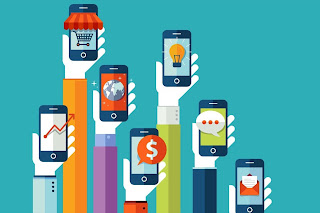Search This Blog
"TechBytes" is the place to go for everything tech related! Welcome! Explore the world of innovative devices, ground-breaking software, and the most recent developments in the technology sector. Passionate tech enthusiasts who are driven by innovation curate our blog.
Featured
- Get link
- X
- Other Apps
What is the difference between an iPhone or an Android?
Their respective operating systems are the main distinction between an iPhone and an Android phone. The operating system that powers Android phones is developed by Google and is utilized by a number of manufacturers, including Samsung, Huawei, and OnePlus, whereas iOS is the operating system that powers iPhones.
The following are some significant variations between Android and iPhone phones:
1) Operating System: As previously said, iOS, the operating system for iPhones, is renowned for having a fluid and easy-to-use UI. Android, on the other hand, gives customers additional freedom and customization choices, enabling them to further tailor their experience.
2) Hardware: Since Apple is the only company that makes iPhones, the hardware quality is consistent throughout models. However, because several manufacturers produce Android phones, there is a greater variety of hardware alternatives available in terms of design, functionality, and price ranges.
3) App Ecosystem: There are notable distinctions between the vast app shops on iOS and Android, which both provide millions of programs. Because of Apple's stringent app review procedure, iOS applications are usually launched first and are frequently seen as being better polished. Conversely, Android gives developers and customers greater freedom by enabling apps that may not be approved for the Apple App Store.
4) Integration with Ecosystem: iPhones are compatible with Macs, iPads, Apple Watches, iCloud, and other Apple goods and services with ease. Android phones enable interaction with a number of third-party services in addition to working flawlessly with Google services like Gmail, Drive, and Photos.
5) Customization: When it comes to customisation, Android is superior than iOS. To fit their tastes, users may install unique launchers, alter themes, and adjust settings. The user experience on iPhones can be more streamlined and consistent while having fewer customization possibilities.
6) Updates: Since Apple owns both the hardware and software for iPhones, upgrades can be applied instantly to all compatible devices. However, because the Android ecosystem is fragmented and multiple manufacturers and carriers are in charge of releasing updates to their own devices, there is a chance that upgrades for Android devices may be uneven or delayed.
Given that each phone offers different features and experiences, the decision between an iPhone and an Android phone ultimately boils down to personal taste. There are people that like Android phones' customization and diversity over iPhones' ease of use and ecosystem integration.
- Get link
- X
- Other Apps
Popular Posts
Which Android applications are the greatest for smartphones and are practical for everyday use?
- Get link
- X
- Other Apps
Main differences between Windows 10 And Windows 11
- Get link
- X
- Other Apps



Comments
Post a Comment